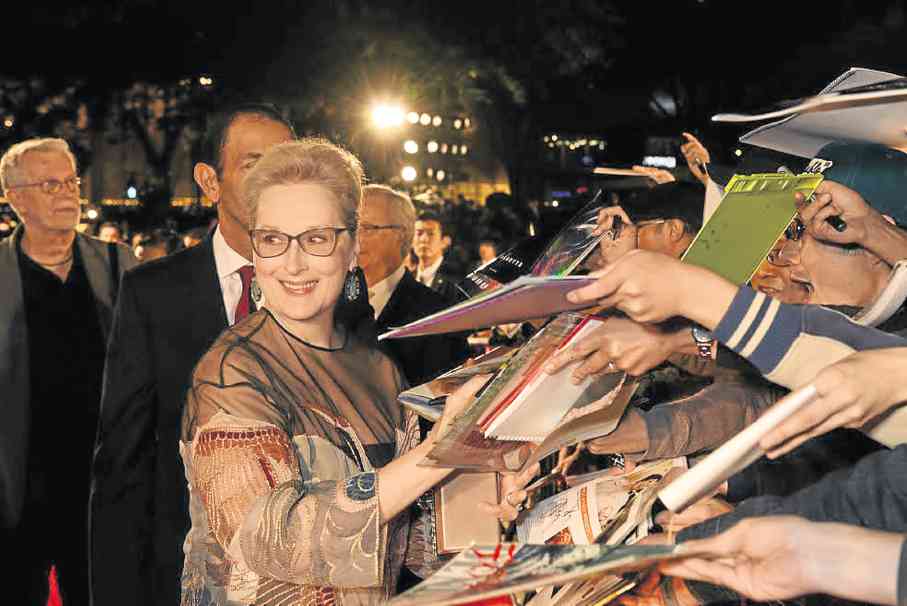Meryl Streep graces a very political Tokyo fest
Tokyo—At the opening night party for the 29th Tokyo International Film Festival on Tuesday, Oscar-winning actress Meryl Streep looked flustered as she took in the adoring cheers from the guests who gathered at the ballroom of the Grand Hyatt hotel in Roppongi Hills.
“Oh, how I wish that Stephen Frears is here,” she quipped, referring to the director of her latest starrer (and Oscar bait) “Florence Foster Jenkins,” the opening film of the A-list Asian fest.
Although she is shielded by a phalanx of handlers and bodyguards, Meryl was able to grant some lucky and enterprising guests’ requests for selfies—even if it meant she had to bend perilously on the edge of the stage.
Ever so gracious, she turned the crowd’s attention to the “distinguished” jury—which is led by president Jean-Jacques Beineix, the French filmmaker behind “Diva” and “Betty Blue.” She expressed confidence that the jurors would do a great job choosing the best film in the main competition (where Filipino director Jun Robles Lana’s “Die Beautiful” is in the lineup).
Last February, Meryl herself acted as jury president of another top festival, the Berlinale, where a Filipino film, Lav Diaz’s “Hele sa Hiwagang Hapis,” won the Silver Bear Alfred Bauer Prize. (“Hele” is also in Tokyo’s World Focus program.)
Article continues after this advertisementThere was a lot of talk of politics in the fest, with the coming US presidential election and the visit of Philippine President Duterte in Japan hogging headlines. Streep is a known supporter of Democratic presidential aspirant Hillary Clinton.
Article continues after this advertisementJuror Nicole Rocklin, producer of this year’s Oscar best picture winner, “Spotlight,” told the press that “she is considering moving to Japan in case a certain candidate wins,” obliquely alluding to the Republican nominee Donald Trump, but she backtracked swiftly, stating, “I am certain she will win.”
Ageism, sexism
During an earlier press event, Meryl got to share her thoughts on major concerns in Hollywood—ageism and sexism.
In “Florence,” she defiantly plays a woman of a certain age—a demographic most men in suits have been ignoring.
“I don’t think there’s ever been a movie in American film history that had as its leading person a 70-year-old character,” she pointed out. “I was playing someone much older than myself. Somehow, I pulled it off.”
She doesn’t turn a blind eye on the issues confronting most women in show biz, though. Remember her fervent cheerleader act at last year’s Oscars when best supporting actress winner Patricia Arquette made a plea for equal pay for women?
“There have been ageism and a lot of so-called market-driven decisions,” she explained. “But I was 58 [years old] when I made ‘Mamma Mia!’ and that was the most popular film I ever made.”
She remained stubbornly optimistic. “All these rules are being broken, and thank goodness! I think a lot of possibilities come from television, especially the long-form, serial television that we have now. It’s been very good for women and has proven that there’s an audience.”
In a separate press conference, jury members also had the chance to tackle the politics of moviemaking.
Beineix riled against a more “insidious” form of censorship that prevents filmmakers from creating works that shake up the status quo. “Cinema needs freedom,” he said.
“Freedom of expression and freedom to get money from those in power.”
Even filmmakers from the so-called free world have a hard time securing support for their pet projects—especially if these films are “innovative and daring,” he noted.
He said he took on the job of jury president with “no pretensions, no expectations, [but] with eyes wide open.”
Of course, in judging films, it all starts with “aesthetics, the rhythm, the quality of the direction and acting,” he clarified. “But content is also important.”
Asked to name a recent film that met his stern criteria, he singled out Tom McCarthy’s “Spotlight,” which was produced by fellow Tokyo juror Rocklin. “It’s character-driven and dares to ask questions [whose answers need] to be revealed.”
The Tokyo film fest ends on Nov. 3.
